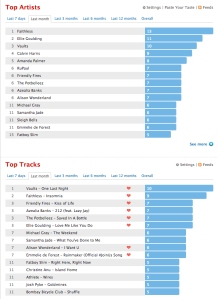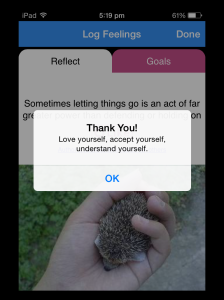When it comes to mobile devices and me, in some ways I’ve embraced them and others I’ve shunned them. Truthfully a lot of my reasoning comes down to ergonomics and convenience.
Yeah you heard me, ergonomics. Look at this thug over here, caring about the positioning of her hands and spine.
My first mobile was a Motorola Razr. One of the hot pink ones that flipped out. I loved that, I was all over it. But when it stopped working, I quickly moved onto LG’s answer to the Hiptop…I think it was called a webslider?

QWERY keyboards on phones were the best. And it was with great stubborness that I finally embraced the smartphone’s touch screen technology. And I miss tactile buttons more than you could ever believe. Seriously I have the world’s clumsiest thumbs. And when you’re typing in a hurry…well…
All of this aside, I love my smartphone. Gone are the days where I used to haul my DS, puzzle book, and crochet supplies with me just so I’d have something to do on the train. (Although this also means I haven’t beaten all the Gym Leaders yet, I miss the papery smell of a well worn puzzle book, and definitely haven’t crocheted anything new for a while. But that’s what long car trips are for.) Plus, I am the queen of settling arguments with my phone. And then of course I got an iPad, to fill the void left in my heart when I sold my laptop. The iPad was just so good for me. It meant I could browse my social media profiles while enjoying my favourite TV shows in the lounge, without having to slip into the squint-o-vision offered by my mobile. Though it is a WiFi iPad, which meant the phone was still the only way to go when out and about. And that’s fine, but when I’m at home, I need to be totally comfortable. What would be the point of relaxing if you weren’t totally comfortable?
While all of these things are worthwhile, the…side effects…are definitely noticeable. Having my phone on me is now as vital as having my keys and my wallet. I couldn’t just leave home without it, don’t be absurd. What if my car broke down in the middle of nowhere and I needed to call RACQ? And of course I need it, I use Out Of Milk as my grocery list and my to do list, I’ve got to have those on me at all times. And I posted that selfie 20 minutes ago, if someone comments on it I need to be right there when it happens so I can bask in the brief high, and can’t you see I just NEED it, itgoesbeyondreasonandit’snotevensomethingyouquestionanymore.
*ahem*
Could it be because it feeds into my already existing anxious tendencies? Yeah that’s definitely a possibility. But come on, the numbers don’t lie. I’m certainly not the only one who feels this way about the phone. They even came up with a name for it: “phone separation anxiety”. I mean how messed up is that? It became so prevalent it became a phenomenon. And every phenomenon needs a catchy name.
All of this aside, this is just talking about my personal preferences. When it comes to work, the portable devices haven’t quite been integrated yet. For uni studies, I find that having my iPad nearby helps. I mean I can do my readings and typing on a desktop, while following my Twitter feed at my right hand. And when I need to take a break, I can slip into DragonVale and check on my little dragon farm.
Yeah, I fell victim to one of THOSE games. But it’s the only one on my iPad I swear, the rest are sudoku and logic puzzles.
There are heaps of other great apps all over the place, and Shazaam is particularly amazing, but I think Michelle says it much better than I ever could, so I encourage you to head over to her blog if you haven’t already.
===
Trigger warning: discussions of eating disorders and body dysmorphia in the paragraphs below.
I’m not going to talk hugely about the quantified self movement and how it impacts me, I feel like I’ve already covered a lot of my feelings in my Play activity. I do also have a Last.fm account, a desktop computer program that collates how many times you play songs in your iTunes library, and also on your iPod when you’re out and about. It “scrobbles” the data whenever new information becomes available, and builds a profile based on your preferences. Last.fm is also a radio streaming website, so the idea is they want to “sell you” more music. But much like MyFitnessPal, it feels like more of a vanity point for me. I like showing off my profile and going “Look what I listened to today!”, like a badge of honour and taste.
And on a completely unrelated note, I seem to have dropped these screen captures into my blog post. Clumsy me.
So one of the recommendations for this particular reflection was to evaluate a quantified self tool and talk about how it could impact a group of people. And when I think about my own quantified self apps, my first thoughts were negative ones. With something that meticulously tracks calories in and calories out, I could imagine it being severely unhelpful for people with body dysmorphia problems such as anorexia and bulimia. Those disorders tend to revolve around people seeking control, and it strikes me as a tool that would simply causes people to obsess in an unhealthy way. The app does have precautions built into it. If you log less than 1000 calories a day (regardless of the calorie plan the app has put you on) where it takes away “positive features”. Normally when you log a day it shows up as an announcement on a Facebook style feed on your MyFitnessPal profile. If you under eat, that doesn’t get “publicised” on your profile. Additionally if you had an attendance streak, logging that low calorie day resets the streak back to day one. I’m not convinced that the negative reinforcement is a good idea to combat eating disorders, but I can see how it works for some people. It worked for me. I came close to logging too few calories for the day, and the truth was I just hadn’t had time to eat the snacks I’d originally planned to.
This made me curious as to what was out there for people with eating disorders. Recovering can be a slow and painful process, because for lots of people you have to gain back up to a healthy weight. So a meal tracker is actually a tool that they need. It just needs to be framed for a different mindset, not for someone like me who eats too much junk food and can’t bend over and touch her toes. Google led me to this handy list of popular apps that assisted people with these disorders in their recovery, and I downloaded Recovery Record to my iPad.
It’s drastically different compared to something like MyFitnessPal. The first screenshot is of the dialogue box that comes up after you log your feelings, which must be a difficult task for some. After you press okay, they’ve included some cute pictures of hedgehogs to scroll through, and even I felt pretty good after looking at those. The second screenshot is of some of the options with the app. It looks like it brings together your personal reflections, clinicians’ advices and recovery plans, as well as resources for emotional and physical health.
We talked in class about the hundreds of thousands of apps being generated every day, and questioned the existence of all of them. In certain situations though, you just need something more fit for purpose. If you can design something to work better, you would. I think you could easily design a different weight management app for every single person on the planet. Because the reasons for weight management are just so diverse, not to mention the headspace of each person embarking on this quest. The Healthline mentions right at the top of the Recovery Record description “It takes a lot for an app to maintain a 5-star rating after more than 1,000 reviews.”. And they’re absolutely right. The quality control system of the 5-star review scale is so vital to the Google Play and the App Store marketplaces. You would just drown without it.
It’s all part of a brave new world, albeit a terrifying deathtrap rollercoaster style new world. And it’s so hard to talk about topics like mobile and quantified self because of the sheer diversity involved. You just have to talk about each case study as it comes up. And in each conversation, consider what’s best for the user in question and ask yourself “What do these people need in this moment in time?”. The frameworks are all there, waiting to make peoples’ lives easier. And while there’s a lot of potential for it to all go so wrong, there is equal potential to create a fantastic place to be. I believe that people as a whole are good. A little self absorbed, but well intentioned. And it’s situations like this when I think you can see those good intentions reflected back at you.
Then of course, you have situations like this that make you think otherwise. Speaking of deathtrap rollercoasters…

Thank you and goodnight!





I find the whole issue of phone separation anxiety really interesting, not so much generally, because yeah, people use their phones for a lot, and even as there’s a societal judgement of this young generation being glued to their phones, there’s also a societal expectation that you will be almost constantly available through technology of some sort. Mostly I find it interesting because I get really anxious about maybe losing my phone (even more than I get at the idea of losing my other things) or not having it on me when I need it – despite the fact that I barely use my phone for anything. It feels like other people have reasons to get anxious about separation, and I’m just over here like ‘but what if I need it for something?’ even though I know perfectly well how little I use it.
LikeLike